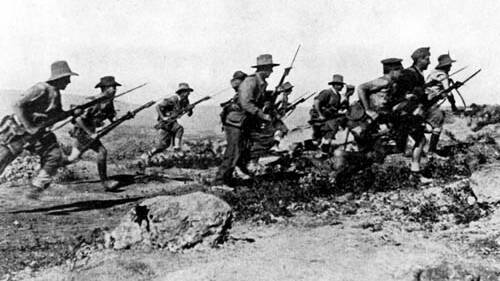
On August 14, 1914, the great novelist and futurist H.G. Wells wrote an article titled "The War That Will End War", in which he predicted that WWI would be the last war.
Subscribe now for unlimited access.
or signup to continue reading
Sadly, as we know today, Wells could hardly have been any more wrong. Since the armistice of the of November 11, 1918, our world has lurched from one conflict to the next. Soldiers who fought in WWI would become some of the key leaders during WW2. Add in conflicts in Korea, Vietnam, Afghanistan, two Gulf Wars, and countless other armed conflicts, both small and large, and it is hard to escape the conclusion that we haven't learnt the lessons of history.
Yet in 1914, the sheer scale of devastation caused by the greatest conflict humanity had yet seen was still in its early stages. One can imagine how Wells and others could believe that the devastating efficiency of Industrial Age killing would make the cost of war so great as to act as a deterrent.
After all, according to the Australian War Memorial: "It is generally accepted that the First World War killed some 16 million people worldwide, of which military deaths constituted about 9.5 million. It is also estimated that around 20 million were wounded, including eight million left permanently disabled in some way."
On Saturday, our nation will pause and remember those who have served in times of War. In Australia, we particularly remember the 102,000 Australians who have given their lives in times of conflict. During our commemorations, we will urge one another to always remember with the words, "Lest we forget".
However, while the Words are familiar to us from the Ode of Remembrance, they are drawn from Rudyard Kipling's 1897 poem, Recessional. Kipling wrote his poem at a high point of British imperial power. In it, he laments a nation that seemed to be chasing the temporary glories of Empire while forgetting the God who had called them to live differently. Calling to mind the twisted figure of Jesus on the cross, Kipling implores his countrymen not to forget God and his God not to abandon his countrymen with the words.
"The tumult and the shouting dies;
The Captains and the Kings depart:
Still stands Thine ancient sacrifice,
An humble and a contrite heart.
Lord God of Hosts, be with us yet,
Lest we forget-lest we forget!"
Sadly, human nature is such that war will never be eradicated by human effort. While war is never a good thing, in the face of true evil, it may, at times, be a necessary thing. Who, after all, could argue that Hitler's Nazi regime did not need to be opposed?
Yet, in an age when our TVs are filled with active conflicts in Ukraine and Palestine, and our tendency is to passionately take sides as we might during a football game, it seems good to remember that God calls us to approach even this most horrific of human activities differently. Not with joy or triumphalism but with great restraint and sorrow at war's occasional necessity.
War will never end in this age. War will never be a good thing. However, when war proves necessary, may God protect us from glorying in it, viewing it lightly, or engaging in it in a manner that causes needless evil and suffering. God calls us to be different. Lest we forget.

